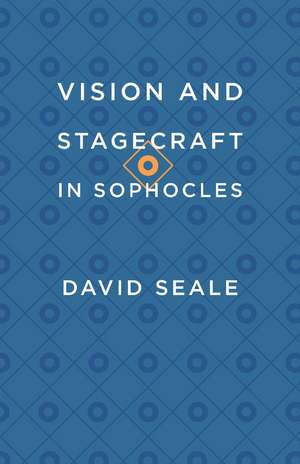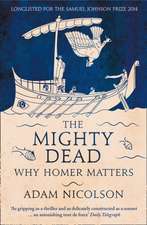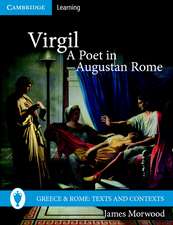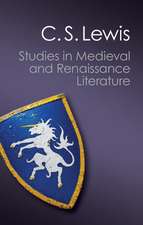Vision and Stagecraft in Sophocles
Autor David Sealeen Limba Engleză Paperback – 23 iun 2014
In this study, David Seale argues that Sophocles’s use of stagecraft, which has thus far received little attention, was as sophisticated as that of Aeschylus or Euripides. His discussions of the physical and visual elements of Sophocles's seven plays center around the theme of sight; he demonstrates that each play is staged to maximize the implications and effects of “seeing” and not “seeing,” of knowledge and ignorance. This emphasis on visual perception, Seale maintains, harmonizes with Sophocles’s use of verbal and thematic techniques to create dramatic movements from delusion to truth, culminating in climaxes that are revelations—moments when things are truly “seen” by both audience and characters.
Preț: 249.62 lei
Nou
Puncte Express: 374
Preț estimativ în valută:
47.76€ • 49.87$ • 39.53£
47.76€ • 49.87$ • 39.53£
Carte tipărită la comandă
Livrare economică 04-18 aprilie
Preluare comenzi: 021 569.72.76
Specificații
ISBN-13: 9780226181745
ISBN-10: 022618174X
Pagini: 270
Dimensiuni: 140 x 216 x 18 mm
Greutate: 0.32 kg
Editura: University of Chicago Press
Colecția University of Chicago Press
ISBN-10: 022618174X
Pagini: 270
Dimensiuni: 140 x 216 x 18 mm
Greutate: 0.32 kg
Editura: University of Chicago Press
Colecția University of Chicago Press
Notă biografică
David Seale is the longest serving member of the university faculty at Bishop’s University, Quebec, where he is a professor of classical studies.
Recenzii
“Interesting . . . with considerable percipience. ‘Vision’ is studied in both internal and external senses. Internally, within the tragedies, there is the pervasive interplay of ignorance and knowledge, secrecy and revelation, illusion and reality, seeing and blindness, sight leading to horror, sight leading to pity. . . . The external sense of ‘vision’ . . . is less well-trodden ground: the use of the visible in order to enhance the audience’s perception of the play. Seale is good at this theatrical approach, and draws out many details without resorting to undue speculation.”
“A new approach. In place of a general commentary on Sophoclean stagecraft or a close study of a particular problem in stagecraft itself, verbal texture and theatrical spectacle are linked through a study of the theme of vision. Seale suggests that a Sophoclean drama is typically a movement from illusion to true sight. This movement is represented both in the language, as characters speak of what they see, and in the spectacle, in which reality is presented before the audience. The great advantage of this approach is the immediate relevance it gives to the spectacle, which embodies the revelation to which the drama leads. . . . Stimulating and enlightening.”















